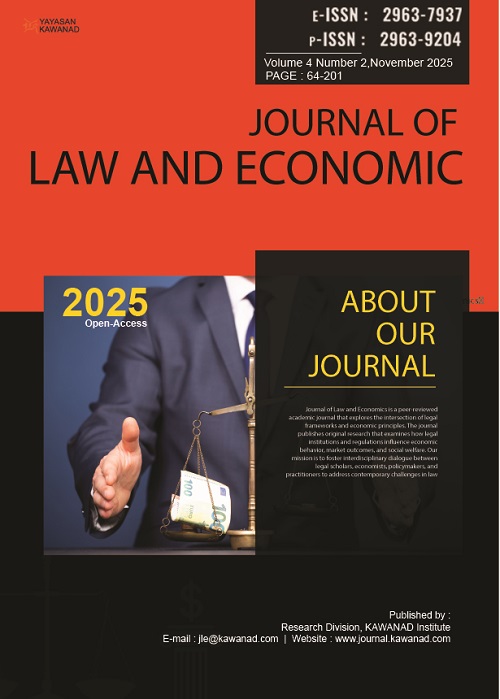TEMPLATE
- masriali@unsyiah.ac.id
- Banda Aceh City, Indonesia
- +6281360650791
Articles
- Home
- Archives
- Vol. 4 No. 2 (2025): NOVEMBER
- Articles
- Home
- Archives
- Vol. 4 No. 2 (2025): NOVEMBER
- Articles
The Doctrine of Unlawful Acts in E-Commerce Consumer Protection
- Authors Serlita Ruben Pendang
- Affiliations
- Published 2025-11-30
- Section Articles
- DOI https://doi.org/10.56347/jle.v4i2.354
- Issue Vol. 4 No. 2 (2025): NOVEMBER
0
Views
0
Downloads
Altmetrics
Abstract
The development of digital technology has driven an increase in transactions through e-commerce platforms. However, this dynamic has also given rise to various violations of consumer rights, such as fraud, goods not as described, and misuse of personal data. This study aims to analyze the application of the doctrine of unlawful acts (PMH) in resolving disputes regarding consumer rights violations on e-commerce platforms. The method used is normative legal research with a statutory, conceptual, and case-based approach. The results show that the elements of PMH as stipulated in Article 1365 of the Civil Code can be applied to cases of consumer rights violations, whether committed by business actors or third parties. Furthermore, developments in jurisprudence have broadened the definition of PMH, allowing consumers to claim compensation not only when there is a violation of the law, but also when business actors act contrary to the principles of propriety, morality, and good faith. Thus, the PMH doctrine can be an important instrument in consumer protection in the digital era, although more stringent specific regulations regarding e-commerce are still needed.
References
- Bisnis.com. (2023, January 23). YLKI ungkap pengaduan konsumen terbanyak di sektor e-commerce. Bisnis Indonesia. https://ekonomi.bisnis.com/read/20240123/12/1734816/
- Dewi, T. R. (2022). Pertanggungjawaban platform digital terhadap pelanggaran konsumen di Indonesia. Jurnal Hukum & Pembangunan, 52(3), 405–422.
- European Union. (2016). Regulation (EU) 2016/679 of the European Parliament and of the Council of 27 April 2016 on the protection of natural persons with regard to the processing of personal data and on the free movement of such data, and repealing Directive 95/46/EC (General Data Protection Regulation). Official Journal of the European Union, L 119, 1–88. https://eur-lex.europa.eu/eli/reg/2016/679/oj
- Fuady, M. (2019). Perbuatan melawan hukum: Pendekatan kontemporer. Citra Aditya Bakti.
- Katadata. (2025, March 20). Kemendag catat 20.942 aduan konsumen, mayoritas berasal dari e-commerce. Katadata.co.id.
- Liuhua, W., Rahardiansyah, T., & Notoprayitno, M. I. (2025). Analisis efektivitas perlindungan hukum konsumen terhadap peredaran barang KW di e-commerce Indonesia. Causa: Jurnal Hukum dan Kewarganegaraan, 14(8), 71–80. https://doi.org/10.6679/728esg88
- Mahkamah Agung Republik Indonesia. (1969). Putusan Nomor 31 K/Sip/1969 tentang perluasan makna perbuatan melawan hukum.
- Nugroho, S. (2021). Aspek hukum transaksi elektronik dan perlindungan data pribadi. Prenadamedia Group.
- Puslitbang Hukum dan Peradilan Mahkamah Agung Republik Indonesia. (2024). Kajian yurisprudensi perbuatan melawan hukum dalam transaksi digital. Mahkamah Agung Republik Indonesia.
- Putri, D. A. (2023). Perlindungan data pribadi konsumen berdasarkan UU ITE dan RUU PDP. Jurnal Lex Renaissance, 8(2), 211–230.
- Rusmiyanto, Anditta (2019) Analisis Yuridis Tentang Tindak Pidana Penipuan Berbasis E-Commerce (Studi Kasus Putusan Hakim No. 94/Pid.B/2002/PN.SLMN, 168/Pid.B./2015/PN.Btl, 185/Pid.Sus/2014/PN.Msb, 311/Pid.Sus/2017/PN.Yyk). Bachelor thesis, Universitas Ahmad Dahlan.
- Selvitri, A. M., Sihombing, G. E. F., & Yafri. (2023). Penerapan prinsip tanggung jawab berdasarkan wanprestasi (breach of warranty) dalam perlindungan konsumen (Studi putusan Nomor 51/Pdt.G/2020/PN JKT.SEL). Samudera Hukum, 1(2), 114-122
- Setiawan, D., Mardiana, D., & Nurjaman, M. I. (2024). Analisis Skema Multi Akad Pada Produk Pembiayaan Sindikasi (Al-Tamwil Al-Mashrifi Al-Mujamma’) Dalam Bidang Pertanian. Iqtishad Sharia: Jurnal Hukum Ekonomi Syariah & Keuangan Islam, 2(2), 107-119.
- Usman, R. (2020). Hukum perlindungan konsumen di Indonesia. Sinar Grafika.
- Zuleika, N., Juninda, N. A., Darwin, Y. A., & Malik, A. (2024). Perlindungan Konsumen Terhadap Testimoni Palsu Dalam Bertransaksi di E-Commerce. Jurnal Intelek Dan Cendikiawan Nusantara, 1(6), 10160-10168.
Author Biographies


Similar Articles
Discover other articles with topics similar to what you're currently reading. Find more references and expand your knowledge base.

More Similar Articles
Personal Data Security Violations in East Jakarta...
Khairul Alwan Albaldan, Nin Yasmine Lisasih
Vol. 4 No. 2 (2025): NOVEMBERModel Bisnis TikTok Shop dan Implikasinya terhadap...
Muhammad Agha Afkar, Yusmaneli
Vol. 2 No. 1 (2023): MAY 2023Legal Protection for Children Exploited as Beggars in...
M. Rizki Fatulloh, Rinaldy Amrullah, Rini Fathonah, Muhtadi Muhtadi
Vol. 4 No. 2 (2025): NOVEMBERLegal Analysis of Marriage Dispensation Requests for...
Rizky Is’Ad Zachary, Nurhayani Nurhayani
Vol. 4 No. 2 (2025): NOVEMBER













